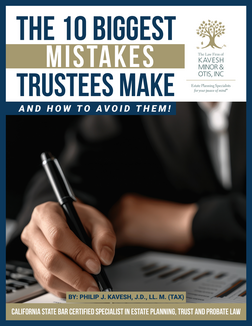Table of Contents
- Guidance for Trustees and Executors
- Why Choose Kavesh, Minor & Otis, Inc. for Trust & Estate Administration?
- Areas We Serve
- Frequently Asked Questions About Trust & Estate Administration
- What is the difference between TrustAdministration and probate?
- How long does Trust Administration take?
- Do I need an attorney for Trust Administration?
- What are the tax requirements for Estate Administration?
- Can beneficiaries challenge the Administration?
- What happens if assets are not properly distributed?
- What is Trust& Estate Administration?
- Why Do You Need Professional Trust & Estate Administration?
- What Our South Bay Clients Have To Say About Their Experience With Kavesh, Minor & Otis INC.
- How Does Trust& Estate Administration Work?
Guidance for Trustees and Executors
Serving as a Trustee or executor carries significant legal and financial responsibilities. We provide comprehensive guidance to help you fulfill your duties properly.
Key Responsibilities:
- Fiduciary duty: Acting in the best interests of beneficiaries
- Asset protection: Safeguarding Estate assets from loss or claims of third parties
- Record keeping: Maintaining detailed financial records
- Communication: Keeping beneficiaries informed of progress
- Compliance: Following all legal requirements and deadlines
Common Mistakes to Avoid:
- Mixing personal and Estate funds
- Making distributions before paying debts and taxes
- Failing to maintain proper records
- Not communicating with beneficiaries
- Missing tax and legal filing deadlines
Why Choose Kavesh, Minor & Otis, Inc. for Trust & Estate Administration?
For over 44 years, The Law Firm of Kavesh, Minor & Otis, Inc. has successfully administered over 4,000 Estates and trusts throughout Southern California. Our extensive experience in Estate Administration provides you with the expertise needed to navigate complex legal requirements and speed up the process, with less work and liability for you as the Trustee or Executor.
Our Administration Experience:
- 4,000+ Estates successfully administered
- 1,000+ Estate tax returns prepared
- 40+ years of Administration experience
- Fixed-fee quotes available for most services
Our Comprehensive Approach:
- Full-service Administration: From start to final distribution
- Tax expertise: Minimizing tax obligations and penalties
- Family communication: Keeping beneficiaries informed and satisfied
- Asset protection: Maintaining protection benefits during Administration and afterward when assets are distributed
Areas We Serve
Our Trust and Estate Administration attorneys serve clients throughout Los Angeles County and Orange County, including:
Los Angeles County:
- Torrance
- Manhattan Beach
- Palos Verdes Peninsula
- Redondo Beach
- El Segundo
- Hermosa Beach
- Gardena
- Hawthorne
- Lawndale
- Carson
Orange County:
- Newport Beach
- Irvine
- Costa Mesa
- Huntington Beach
- Laguna Beach
- Mission Viejo
- Anaheim
- Orange
Frequently Asked Questions About Trust & Estate Administration
What is the difference between TrustAdministration and probate?
Trust Administration is a private process that avoids court supervision, while probate is a court-supervised process required for Estates without trusts. TrustAdministration is typically faster, less expensive, and more private than probate.
How long does Trust Administration take?
Trust Administration typically takes 4-18 months depending on the complexity of the Estate and assets involved. Simple trusts may be completed in 4-9 months, while complex trusts may take 9-18 months or longer.
Do I need an attorney for Trust Administration?
While not legally required, professional assistance is highly recommended due to the complexity of legal requirements and potential personal liability. Mistakes in Administration can be costly and may result in personal liability for Trustees.
What are the tax requirements for Estate Administration?
Estate Administration may require filing federal Estate tax returns and income tax returns depending on the Estate's size and income. Tax deadlines are strict and penalties for late filing can be significant.
Certain California filings may be necessary to avoid a real estate tax increase.
Can beneficiaries challenge the Administration?
Yes, beneficiaries can challenge Administration if they believe the Trustee or executor is not fulfilling their duties properly. Proper Administration and communication can help prevent disputes and challenges.
What happens if assets are not properly distributed?
Improper distribution can result in personal liability for Trustees and executors, tax complications, and legal challenges from beneficiaries. Professional guidance ensures proper distribution procedures are followed.
Have more questions? Visit our comprehensive FAQ page or read our Estate planning blog for more insights.






